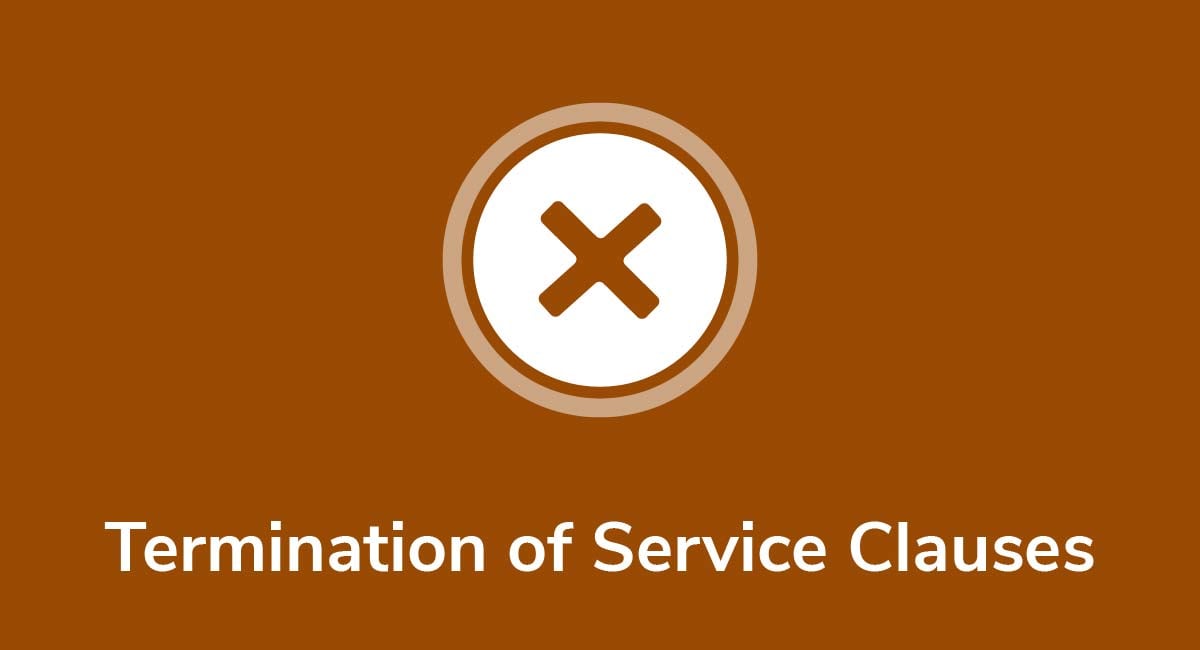Terms and Conditions for Memberships
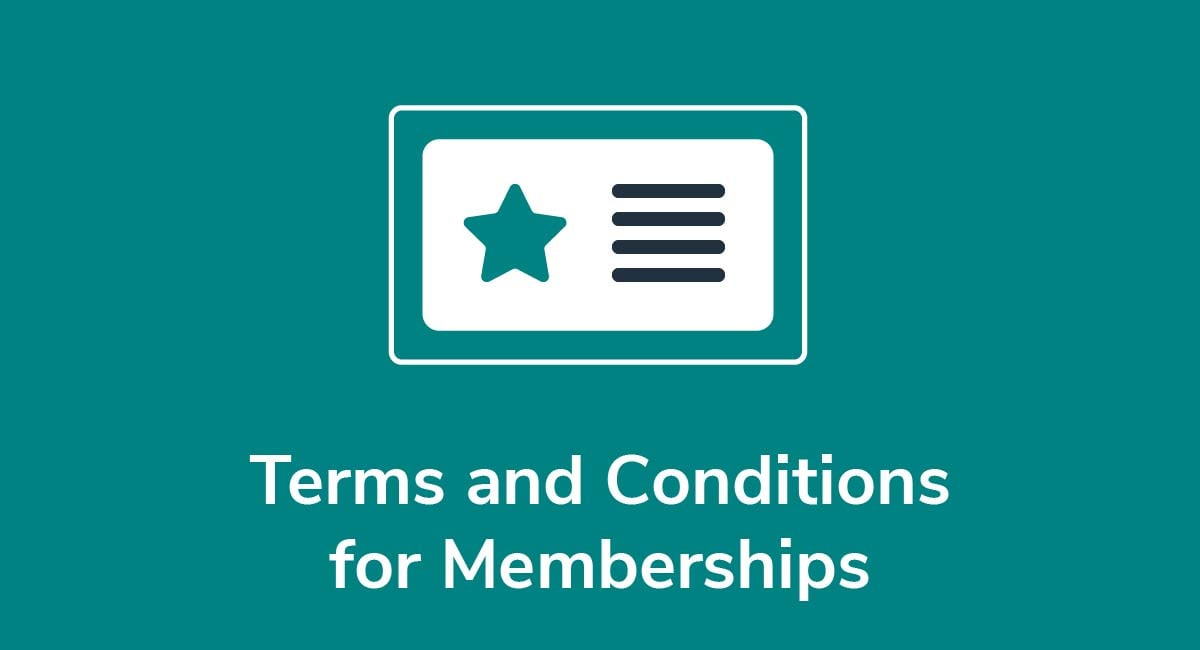
If your website or mobile app has a membership component, this is something that you'll need to outline within your Terms and Conditions agreement.
In your Terms agreement, you can lay out the rules, restrictions, and limitations that apply to aspects of membership, such as paying membership fees, using a product or service, and how to terminate a membership account.
In this article, we'll explain why Terms and Conditions agreements for memberships are so important and show you how to create one for your membership platform.
Need Terms and Conditions for your business? We can help you generate a customized Terms and Conditions agreement in around two-three minutes for free. Try our Terms and Conditions Generator and just follow these steps:
- Click on the "Create your Terms and Conditions today" button.
- At Step 1, select the where will you use your Terms & Conditions and click "Next step":
- Add information about your business:
- Select the country and continue to the "Next step":
- Answer the questions about your business practices and click "Next step" when finished:
-
Enter your email address where you'd like your agreement sent and click "Generate."

You're done! Now you'll be able to instantly access and download your new agreement.
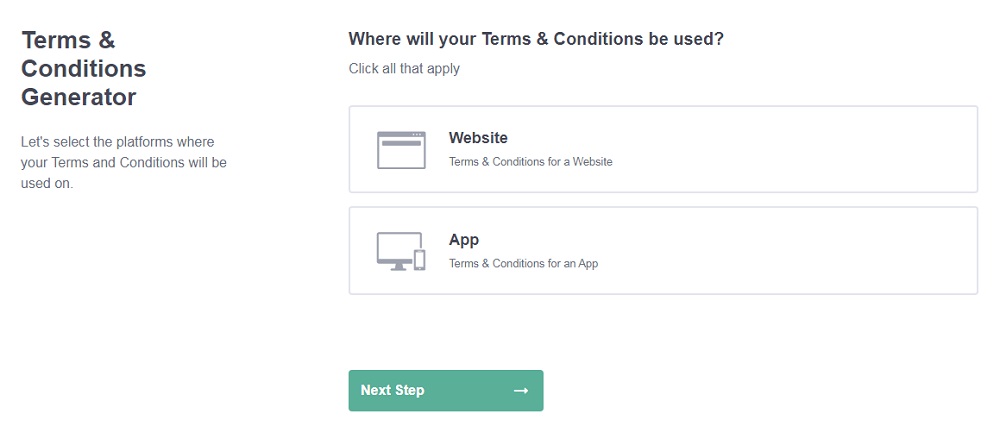
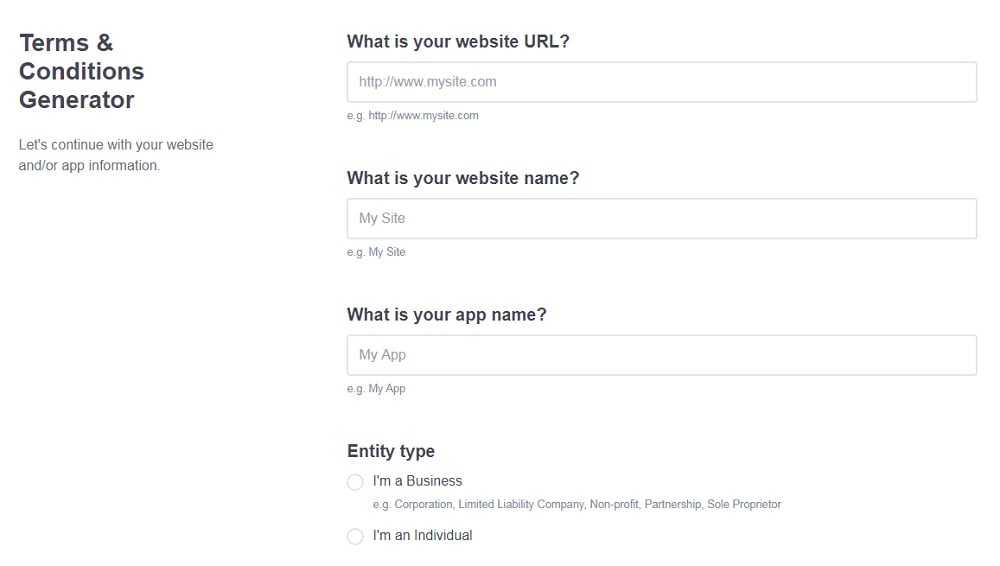

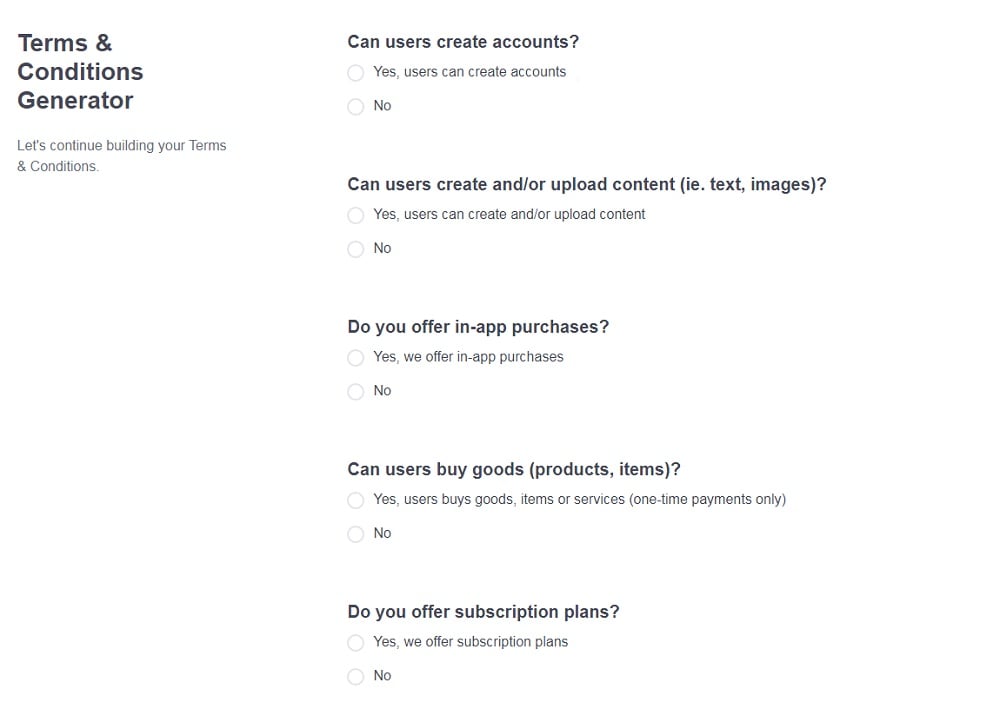
- 1. Are Terms and Conditions for Memberships Legally Required?
- 2. Why Should You Have Terms and Conditions for Your Memberships?
- 3. What Clauses Should Be Included in Terms and Conditions for Memberships?
- 3.1. Introduction
- 3.2. Pricing and Payments
- 3.3. Application and Review Process
- 3.4. Intellectual Property and Copyright Protection
- 3.5. Prohibited Uses and Behaviors
- 3.6. User-Generated Content (Submissions)
- 3.7. Termination of Memberships
- 3.8. Cancellation of Membership and Refunds
- 3.9. Trial Memberships and Promotions
- 3.10. Making Changes to Terms and Conditions for Memberships
- 4. How Do You Display and Get Consent to Terms and Conditions for Memberships?
- 5. Summary
Are Terms and Conditions for Memberships Legally Required?
No, you are not legally required to have a Terms and Conditions agreement for your membership website.
However, there are many important reasons why you should have one regardless.
Why Should You Have Terms and Conditions for Your Memberships?

Having a Terms and Conditions agreement for your membership site makes sense for a number of reasons.
First, it will protect you and your business.
The fact is that you're exposing yourself to unnecessary risk and liability if you don't have a thorough and well-written Terms and Conditions agreement. For example, one customer may try to hold you responsible if another customer posts an offensive comment on your website.
Thankfully, you'll be covered if you have a Terms and Conditions agreement that adequately addresses prohibited behavior and user-generated content.
In addition, your Terms and Conditions agreement should promote clarity for current and future members by letting them know what to expect all the way from application to termination.
An example here would be informing members that they're required to cancel their memberships five business days before the automatic renewal date, and that if they don't, no refund will be given.
What Clauses Should Be Included in Terms and Conditions for Memberships?

No two Terms and Conditions for memberships are exactly alike. You'll need to customize yours to address the nuances of your business. However, they often contain similar clauses that broadly apply to the membership model in general.
It's also worth pointing out that some sites have all-encompassing Terms and Conditions that apply to the whole business, while others have separate Terms and Conditions agreements for the membership and non-membership portions of the business.
Either way is fine, as long as all relevant information is addressed.
Now let's look at some clauses from actual membership websites.
Introduction
Terms and Conditions for memberships often begin with a brief introduction that spells out who can use the site, or enter into a membership agreement.
Here's an example from diaper membership service Parasol:

In its Terms of Service introduction, Parasol lets visitors know that:
- Access to and use of the site is subject to the terms and conditions contained therein
- They must be at least 18-years-old, accompanied by a parent or guardian, and legally able to enter into a contract
- They shouldn't use the site if they don't agree to the terms
Pricing and Payments
Include your policy on payments and membership pricing.
Terms and Conditions for membership don't generally include prices. Instead, the prices for different memberships are typically found on home, application, and dedicated membership pages.
However, aspects of pricing such as the price being subject to change, is relevant to include in your Terms and Conditions.
Here's how The Way Forward does it:

In regard to payments, your Terms and Conditions should address things like:
- When payments are due
- How customers can pay (credit or debit card, cash, personal, certified, or cashier's check)
- How payments are processed
- What happens if a member fails to make a payment or if payment is declined
Here's how The Way Forward addresses payments in its Terms of Service:

This short clause lets members know that:
- Products won't be shipped and services won't be provided if payment isn't received or is declined
- Orders may be delayed if card payments aren't validated by the issuer
Application and Review Process
Many membership applications are processed and accepted quickly or even instantly, but this isn't always the case. The process can take hours or days when applications are reviewed manually.
Either way, your Terms and Conditions agreement should detail how the application and review process works and how long it usually takes. If applicable, you should also let users know that their application for membership might be declined.
This is how The Way Forward covers its membership application and review process:

The Way Forward lets applicants know that the company reserves the right to reject any application for any reason.
This may not sit well with eager applicants, but having a membership application declined isn't necessarily the end of the road. The company encourages those who've been turned down to reach out if they feel an incorrect decision was reached during the review process.
Intellectual Property and Copyright Protection
Intellectual property and copyrighted material is worth addressing in Terms and Conditions not only because it's protected, but because it makes your membership website unique. This can include things like articles, trademarks, works of art, and concepts that you developed or own.
As such, your Terms and Conditions agreement should state that it's illegal to use your intellectual property or copyrighted material without your consent.
Here's how The Way Forward addresses intellectual property and copyrighted material:

Prohibited Uses and Behaviors
Most Terms and Conditions agreements include clauses that spell out what uses and behaviors are prohibited.
By doing this, you'll gain a fair amount of control and position yourself to take action if members abuse their privileges or engage in prohibited behavior.
For example, your Terms and Conditions agreement may prohibit members from:
- Using your product or service commercially or from sharing it with any other person or entity
- Using offensive language
- Posting inappropriate content
- Exploiting children
- Breaking the law
Here's another example from The Way Forward:
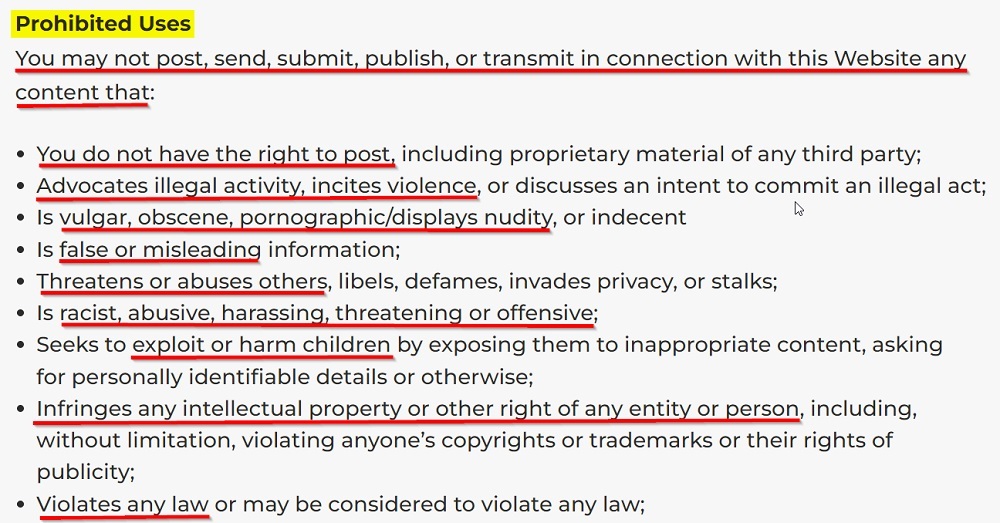
User-Generated Content (Submissions)
Some membership sites have forums where members can chat and post other user-generated content. Members may find this kind of feature helpful, but user-generated content can cause problems because it's impractical (or downright impossible) to monitor all communication and review all posts to ensure that no rules have been violated.
As such, your Terms and Conditions should clearly state that members are solely responsible for the content they post.
If not, you could find yourself in hot water if offensive, derogatory or illegal comments or material wind up on your website.
This is how The Way Forward addresses submissions:

This clause also makes it clear that the company has lots of leeway in what it does with information posted to the website.
In addition, the clause states that:
- Submissions may not be treated as confidential
- By making submissions, users guarantee that they own or have the legal right to the content they post
Termination of Memberships
When it comes to memberships, termination is generally a two-way street.
As a business or website owner, you should assert your right to suspend or terminate a customer's membership at any time, for any reason, or for no reason at all.
Since a member may also choose to cancel his or her own membership, it's important to lay out the rules, restrictions, and time limits that apply if they do.
Cancellation of Membership and Refunds
Cancellation and refund policies vary from one membership site to the next, but most Terms and Conditions agreements address both in detail.
Before signing up, most visitors want to know that it won't be a huge hassle if they decide to cancel their membership later on.
Here's how The Way Forward addresses termination:

Trial Memberships and Promotions
However, many companies offer promotions, free trials, and short-term passes so customers who are considering becoming members can "try before they buy."
If you do this, this should be addressed in Terms and Conditions because promotions generally have different rules, restrictions, and limitations than standard memberships.
Here's how the Female Entrepreneur Association addresses trial memberships in its Terms of Service:

Here's how The Way Forward addresses promotions:

Making Changes to Terms and Conditions for Memberships
In addition to asserting your right to change, update and amend your Terms and Conditions at any time, you should let users know that you may not (or will not) notify them and that it's their responsibility to check the website regularly to see when the agreement was last updated.
In this example, The Way Forward lists the most recent update at the top of its Terms of Service:

Here's how the company addresses changes to Terms and Conditions:

Now let's look at how to display your Terms and Conditions and get consent to it, so that people are able to view it before signing up for your membership program.
How Do You Display and Get Consent to Terms and Conditions for Memberships?

Terms and Conditions agreements are generally displayed in a few common locations where users can quickly and easily access them at any time and from multiple areas.
These locations include:
- In a website's footer
- In an in-app menu (Settings, Legal, Info, etc.)
- Within the account/membership sign-up form
Here's how the International Gem Society links to its Terms of Use from its website footer:

Here's how IncrediBundles displays its Terms agreement at the bottom of the account creation form:
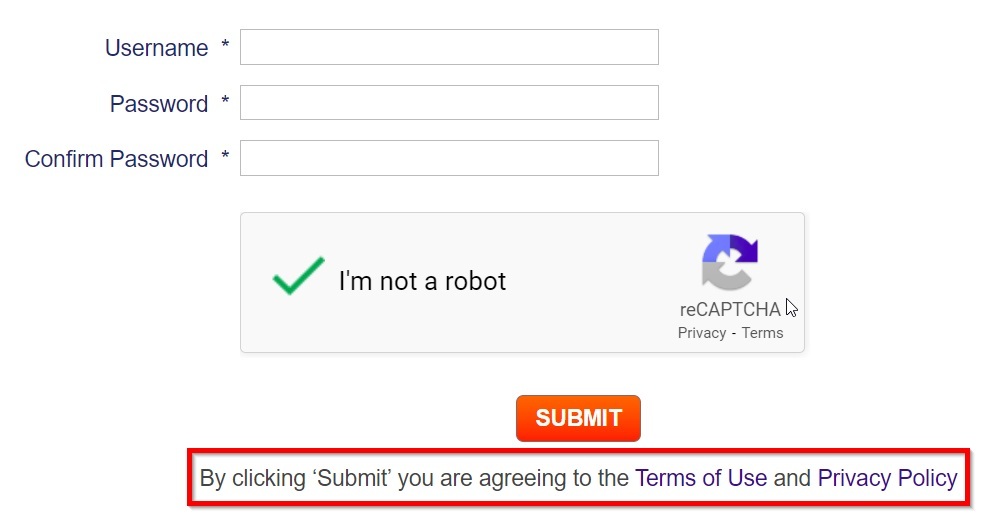
In this example, Amazon Prime links to its Terms and gets consent when customers sign up for a free trial:

Get consent by requesting that users check a checkbox next to an "Agree" statement when signing up, as seen here:
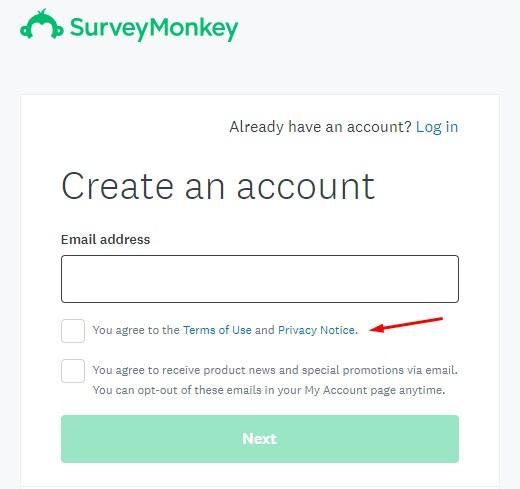
Summary
If you own a membership business or website, having a thorough and well-written Terms and Conditions agreement can protect you and your business by limiting liability and minimizing risk.
You aren't legally required to have one, but if you don't, your membership website could become a liability instead of an asset.
You can use your Terms agreement to establish ground rules and promote clarity and peace of mind for visitors who are considering becoming full-fledged members.
No two Terms and Conditions for memberships are exactly alike, but many include/address the following:
- Introductions
- Pricing and payment
- The application and acceptance process
- Intellectual property
- Prohibited uses and behaviors
- User-generated content
- Termination and cancellation
- Trial periods
Make sure to get active consent to prove that new members have seen, understood, and agreed to your Terms and Conditions. An "I Agree" checkbox is a good way to do this because users can be prevented from moving forward in the application or payment process until they do.


